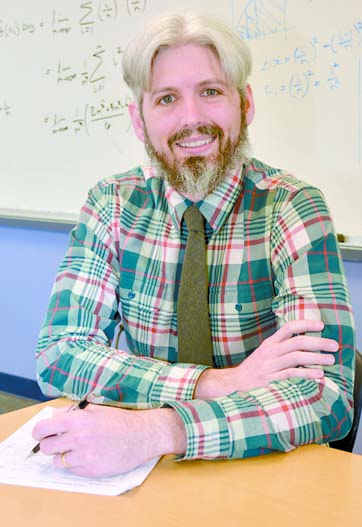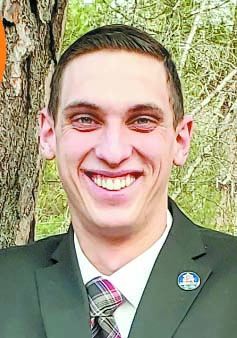On the Ballot: House District 82

Age: 36
Residence: Hiram
Professional Background: Teacher of Mathematics and Computer Science at Sacopee Valley High School for 11 years; Vice-President of Tri-County Teachers Association; Treasurer of the Porter Grange #569; Co-President of Pi-Cone South Math League; Board Member of Francis Small Heritage Trust.
Personal Background: I enjoy woodworking, homebrewing and baking. I maintain a sourdough starter that has an alleged “pedigree” of 180 years-plus.
The race for Maine House of Representative District 82 is a battle between two newcomers, Democrat Nathan Burnett of Hiram and Republican Caleb Ness of Fryeburg.
HD 82 includes Brownfield, Fryeburg, Hiram, Lovell and Porter.
The News posed the following questions to the candidates, and their answers are arranged alphabetically.
Election Day is Tuesday, Nov. 8.
Q. Why did you decide to enter politics?
Burnett: I feel I have something to offer. Four years ago, we were at the height of attempting to implement standards-based education results (that were being developed district-by-district and had nothing standardized about them) and there were many people telling teachers how to do their jobs that had no idea what our jobs were. That’s what got me started, and it’s still something that drives me, but that’s not the only reason I’m still at this, or why I spent this summer knocking on doors. This is my third time running. I ran four years ago, but lost a primary race. I ran two years ago, during COVID, and I made phone calls to over 4,000 voters, but lost again. This time, I’ve been able to get out and knock on doors, and I’ve enjoyed every minute of it. At this point in the campaign season, I believe I’ve been down every road in the district.
Ness: With the seat open, I wanted to take the opportunity to try and make a significant difference in our state and give us an opportunity to grow.
Q. What strength/skills would you bring to the position?
Burnett: I’m a hard worker and a good listener, just ask any of the 1,400-plus people I had conversations with at the 3,000-plus doors that I knocked on this year. As a teacher, I’m used to explaining this multiple ways and multiple times. I’m patient, curious and a lifelong learner. I make a positive impact on the lives of around 100 kids a year at Sacopee. If I am sent to Augusta as your representative, I believe I can help everyone.
Ness: As a Constitutionalist, I am a student of the Founders and their intent for our state and country. I have an understanding of how government was intended to operate.
Q. What do you believe the role of government should be?
Burnett: There’s a Lincoln quote that I came across earlier this year that I strongly agree with. I tried to retype it here, but felt I was missing something important, so I went and got the actual quote:
“The legitimate object of government, is to do for a community of people, whatever they need to have done, but cannot do, at all, or cannot, so well do, for themselves — in their separate, and individual capacities,” — Abraham Lincoln, Fragment on Government, 1854.
Lincoln used a few more commas than we are all used to using today, but if you give that a few passes, I think he hit the nail on the head.
Ness: I believe government’s purpose is to help create and maintain an environment where citizens can thrive. It is instituted to protect God-given rights.

Age: 23
Residence: Fryeburg
Professional Background: I currently work at Harmac, a rebar fabrication shop in Fryeburg. I’ve worked there for over a year. Previously, I worked at Lowe’s in North Conway for about two years. In 2015, he founded the Constitutional Awareness PACT to help educate citizens about the Constitution and government. He served as a volunteer campaign staffer for State Representative Nathan Wadsworth.
Personal Background: I was born and raised in the area. I lived in Center Conway until 2009, then moved to Fryeburg. My dad, Erick, is the 26-year pastor of the Center Conway Baptist Church. My mom, Melanie, works retail in North Conway, and my sister, Hannah, works as a banker.
Q. If elected, what would be your three priorities?
Burnett: High speed Internet for rural Maine, addressing the educational lag COVID created, and modernizing energy policies for the state.
We need proper, modern, high-speed fiber Internet. The COVID pandemic made it crystal clear how important proper high-speed Internet is in order for students to continue their learning while we were all remote. It also is the backbone of our modern society, and Maine is being left behind as people are unable to participate fully and effectively in the new jobs that require high-speed connections. Also, for the folks who are able to live their lives without high-speed Internet, I’ve had many conversations with people who aren’t able to right size their living situation and sell their homes because the Internet connection is just too poor. As an example of what I’m talking about, these sorts of improvements can be modeled and built upon the work that has already been accomplished by the Downeast Broadband Utility in Downeast Maine.
The educational lag that was created during COVID will have lasting impacts as our next generation of workforce makes its way through the pre-K to 12-plus education system. There are many unique gaps that every student developed while they were learning and it will take time for those all to be remediated. I want to be a voice in Augusta for this upcoming generation that doesn’t get to vote, yet.
And lastly, I’d like to see our state make investments in all of our futures by incentivizing and investing in municipal and residential solar and other localized power projects. It is important to note that this policy idea is to be differentiated from investment solar projects for investors. It is important that the monetary savings and returns that exist in investing in power should be realized by “we, the people” not “they, the investors.”
Ness: 1.) Allowing Mainers to keep more of their money to incentivize economic growth and better business.
2.) Keep Augusta fiscally accountable, to eliminate waste in the systems, and keep government working efficiently.
3.) Ensure educational transparency so parents and teachers are on the same page.
4.) Bring a fresh perspective to Augusta with new energy and new ideas.
Q. What issues/problems do you feel the state has fallen short on and what do you propose to do to improve that situation?
Burnett: As I stated above, my policy goals are all places where the state has fallen short. I believe I’ve outlined improvements that could be made.
Ness: We are woefully unattractive to business due to a high tax burden and the fact that we are out of the way. We need to responsibly lower taxes to attract businesses and keep our young people here.

